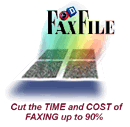3D Fax
From Just Solve the File Format Problem
(Difference between revisions)
Parchivist (Talk | contribs) |
Parchivist (Talk | contribs) |
||
| (2 intermediate revisions by one user not shown) | |||
| Line 13: | Line 13: | ||
Downloads for versions 1.5 and 2.5 (different formats) can be found on the [https://web.archive.org/web/20000301233413/http://infoimaging.com/product/faxfile.htm archived product page] | Downloads for versions 1.5 and 2.5 (different formats) can be found on the [https://web.archive.org/web/20000301233413/http://infoimaging.com/product/faxfile.htm archived product page] | ||
| − | Further developed into [[ | + | Further developed into [[INTACTA.CODE]] |
| Line 19: | Line 19: | ||
* In 1987 Oded Kafri invented the random grids which were utilized for 'Visual encryption' and later for printing binary data on papers (which is the basis of the two-dimensional barcode) | * In 1987 Oded Kafri invented the random grids which were utilized for 'Visual encryption' and later for printing binary data on papers (which is the basis of the two-dimensional barcode) | ||
* Software developed by Fontech Ltd. based in Beer Sheva, Israel to sell to the Israeli government to provide a way of securely sending data via fax | * Software developed by Fontech Ltd. based in Beer Sheva, Israel to sell to the Israeli government to provide a way of securely sending data via fax | ||
| − | * originally licensed to AT&T as Surity | + | * [[Fontech Fax-O-File]] originally licensed to AT&T as Surity |
* started InfoImaging Technologies, Inc. in 1994 in California (originally Palo Alto, then later Pleasanton) after winning Most Innovative Product at the 1993 CeBit for 3D Fax File | * started InfoImaging Technologies, Inc. in 1994 in California (originally Palo Alto, then later Pleasanton) after winning Most Innovative Product at the 1993 CeBit for 3D Fax File | ||
| − | * Rebranded/continued as [[ | + | * Rebranded/continued as [[INTACTA.CODE]] in 1997 |
Latest revision as of 02:59, 29 July 2023
3D Fax (also 3DFax) is a Windows program, developed for InfoImaging Technologies by sister Israeli company Fontech in the mid-1990s, for file transfer via fax (FTF). The program encodes a file into an InfoImage, which the user would then print and send via a fax machine or transmit directly from the computer using a fax modem. The recipient would then scan the transmitted image or receive it via a fax modem, and use 3D Fax to decode it back to its original binary form.
- v1.0 - 40kB per sheet of paper
- v2.0 - up to 110kB per sheet of paper
Downloads for versions 1.5 and 2.5 (different formats) can be found on the archived product page
Further developed into INTACTA.CODE
[edit] History
- In 1987 Oded Kafri invented the random grids which were utilized for 'Visual encryption' and later for printing binary data on papers (which is the basis of the two-dimensional barcode)
- Software developed by Fontech Ltd. based in Beer Sheva, Israel to sell to the Israeli government to provide a way of securely sending data via fax
- Fontech Fax-O-File originally licensed to AT&T as Surity
- started InfoImaging Technologies, Inc. in 1994 in California (originally Palo Alto, then later Pleasanton) after winning Most Innovative Product at the 1993 CeBit for 3D Fax File
- Rebranded/continued as INTACTA.CODE in 1997
[edit] Links and references
- Wikipedia article
- Article in 27 June 1995 PC Magazine
- Ad from July 1995 PC Magazine
- Review in 10 July 1995 InfoWorld
- Press Release for v2.0 in 27 November 1995 Computerworld
- Archived product page
- Video review from 1997 The Computer Chronicles
- History of Fontech and 3D Fax technology
- Oded Kafri biography
- Encryption of pictures and shapes by random grids by Oded Kafri and Eliezer Keren
- Patent 4776013: Method and apparatus of encryption of optical images
